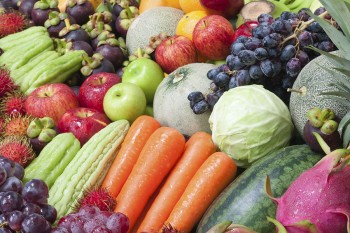Seven Nutrition Tips to Keep You Sober

If you are in addiction recovery, it may be tempting to allow yourself to indulge in all the junk food you can eat.
After all, you have your addiction to tackle, why take on the stress of monitoring your food when you could be eating whatever you want?
Well, evidence suggests that eating habits can hinder you rather than help you on your path to recovery.
Drug and alcohol addiction typically wreaks havoc on a person’s body. An addict consumed by their addiction is less likely to eat healthily. Some drugs cause you to eat too much, others too little. It is crucial that proper nutrition is part of the path to staying sober.
Proper nutrition allows you to feel better both mentally and physically. Additionally, research proves that healthier eating increases the chances of getting and staying sober.
How Proper Nutrition Aids the Healing Process
Proper nutrition gives the body energy to help build and repair organ tissues as well as strengthen the immune system. Addicts sometimes have damaged vital organs from their drug abuse so good nutrition helps restore those damaged tissues.
Changes in diet alter the brain on both a chemical and physiological way. The consumption of certain foods high in vitamins and minerals increase production of serotonin which enhances mood. Mood plays a major role in sobriety because often high stress and emotions can cause a person to want to use again. Learning how to balance your mood can be critical to recovery.
Feeling better both mentally and physically increases the chance of recovery. Often, addicts find it hard to decipher hunger because they confuse hunger for a drug craving. As an addict, you might even be unfamiliar with the feeling of hunger and this could increase to chance of falling into relapse. Eating frequent healthy meals throughout the day can prevent this disastrous mistake.
Seven Nutrition Tips to Keep You Sober
- Step up Your Protein Game
Amino Acids, the building blocks of proteins, allow neurotransmitters to release happy chemicals like serotonin, dopamine and norepinephrine. Since chemicals like dopamine are associated with a drug “high,” it is critical to restore chemical depletions with increase amino acid consumption. It curves the craving to use again.Alcoholics need an increased amount of norepinephrine because there is depletion in the withdrawal process. Increase consumption of foods with amino acids fulfill the need for this neurotransmitter during withdrawal which improves the chance for a successful recovery. - Lower Caffeine Consumption
I love coffee. In fact, I am drinking coffee as I write this.However, studies show high caffeine consumption is not beneficial for recovery. Caffeine is stimulating and can trigger mood fluctuations that make it harder to resist cravings for alcohol or drugs.Caffeine goes straight to your brain where it causes an increase of adenosine receptors which are responsibly to caffeine’s addictive nature. - Increase Antioxidant Consumption
Eat your fruits and veggies! These are packed with antioxidants that rebuild your immune system during your recovery. In addition, these nutrient-dense foods help restore your skin and hair. Antioxidants protect cells from free radicals that can lead to cancer.Add fresh or lightly cooked vegetables and fresh fruits to your daily diet for maximum impact. - Eat Smaller Meals More frequently
Instead of eating one huge meal 2-3 times a day, it is recommended you eat smaller meals more frequently throughout the day. This way you are never hungry yet never too full. Also, recovering addicts should carry snacks to avoid sugar crashes and keep blood sugar levels stable. - Increase Intake of Probiotics
Certain substances like alcohol and opiates can negatively impact the stomach. So if you are recovering from these substances, you need to restore your gut health through increasing your intake of probiotics.Stock up on yogurt or take supplements to aid in increasing your consumption.
Probiotics play a role in the production of serotonin levels which is associated with depression and maintaining serotonin levels is important in recovery. - Avoid Sugary Foods and Refined Carbs
If you tend to gravitate to sweets and refined carbs; they can cause mood fluctuations that make it harder for you to make healthy choices. They also provide empty calories that prevent you from eating nutrient dense foods that you desperately need. Replace sugary foods like cake with whole grains, nuts and complex starches. - Pack in the Fiber
Alcohol and drug abuse upset your digestive system so adding fiber to your diet will help your body recover faster. Replace simple carbs with whole grains. Brown Rice, beans, and high fiber veggies will help transform your system. If it is difficult, try starting out with a fiber supplement. - Keep a Food Journal
Food Journals are not for everyone. Honestly, I never enjoyed doing them but it was always helpful to monitor any changes in my diet and make adjustments. Changes in nutrition could be a sign of mood imbalances. Track your eating for recovery success!
Making changes in your diet should be a lifestyle choice. Your diet will not always be perfect but making choices that benefit your body and brain as they heal will help you succeed a fulfilling sober lifestyle.
Remember to talk to a nutrition specialist before you make any changes in your diet. If you or someone you love is struggling with substance abuse or addiction, please call toll-free 1-800-777-9588.
